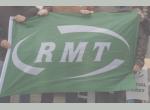Similar topics:
Attached documents
Click '1 attachment' / file name to read the full decision by the Employment Tribunal, which upheld Eamonn's complaint of unfair dismissal on the grounds of trade union activities.
As outlined by our solicitors, the key aspects of the judgment are:
(1) The Tribunal unanimously found that Eamonn had been unfairly dismissed and more importantly, automatically unfairly dismissed on grounds of his health and safety and trade union duties and activities.
(2) The Tribunal found that Eamonn Lynch was a straightforward and truthful witness. London Underground’s investigator also found that he was frank and honest. By contrast, Ms Alana Stewart, the chair of the disciplinary panel, was found by the Tribunal to be an unsatisfactory and unreliable witness.
(3) The Tribunal found London Underground failed to follow their own procedures when deciding to refer the case to a company dismissal hearing. They concluded it is likely his case was widely discussed amongst managers because of his trade union status instead of the decision being taken by the investigating manager.
(4) The Tribunal found Eamonn Lynch was dismissed principally because he was a member of a health and safety committee. The found this role was inextricably bound up with his status as a union organiser and, consequently, he was also dismissed because of his trade union activities. They observe his health and safety committee responsibilities were specifically stated as being a reason for his dismissal.
(5) The Tribunal found the manager who conducted the appeal, Mr Chris Taggart, was principally concerned with exculpating his colleagues (the managers who conducted the disciplinary hearing) from blame instead of investigating Mr Lynch’s case fairly.
(6) It was found that the fact that he was a health and safety committee member prayed heavily on the minds of the disciplinary panel as was demonstrated from the fact that Simon Jones mentioned the matter on 4 separate occasions in the course of the hearing.
(7) The decision to dismiss was unusually harsh bearing in mind that:
a. He had no previous adverse disciplinary finding;
b. The C [Claimant ie. Eamonn] proceeded under caution and emptied his train;
c. Lack of evidence of consideration by R during the investigation whether the issue was conduct related or performance related;
d. This was not an aggravated incident;
e. At all times C was in contact with the Signaller and Control who were aware of what was going on and instructed C to move and/or continue to move the train;
f. C admitted his error.
Given the above mitigating factors and the absence of an aggravating feature such as covering up his offence or prior warning, no reasonable employer would have found the threshold was met in this case.
(8) Also, the harshness of the dismissal is evident from the circumstances of a comparator whose offence was more serious than that of C and yet was not dismissed. Further, no disciplinary action was taken against the controllers.
(9) The tribunal concluded the dismissal was far too harsh a sanction and that no reasonable employer would have decided dismissing Mr Lynch was proportionate.
- 3041 reads






